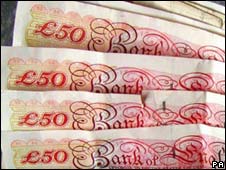 Nick Buckles said people tended to use cash to budget in tough times Nick Buckles said people tended to use cash to budget in tough times |
The number of £50 notes in circulation has increased by 20%, according to the chief executive of the world’s biggest security transport company.
Nick Buckles, from G4S, told BBC Radio 4’s Bottom Line that it appeared people were “hoarding cash at home”.
He said cash in circulation tended to increase in “tougher times” as people shied away from credit.
UK payments body APACS said more use of £50 notes might reflect a lack of trust in the government’s deposit protection.
In the event of a bank failure, the Financial Services Compensation Scheme will guarantee up to £50,000 deposited with an authorised bank.
APACS (the Association of Payment Clearing Services) said it could be that the rise in the number of £50 notes indicated that some people had exceeded that savings threshold.
But it said circulated cash often increased in the lead up to Christmas, and no sudden and unexpected variances from that trend had been officially recorded so far.
‘Budgeting’
Mr Buckles said there was “some very different behaviour” happening as a result of the economic downturn.
Nick Buckles, G4S |
“Cash payments are increasing all the time,” he said.
“Although the retail take is going down, there’s more switching onto cash payments, so our processing of cash is actually picking up in terms of volume.
“What we’ve seen over cycles before is that cash in circulation increases during tougher times.
“People use it as a means of budgeting. They don’t like credit, so clearly there’s more cash transactions, more ATM transactions.
“And I guess the £50 note issue is people hoarding cash at home.”
Mr Buckles said European banks had issued about 30bn Euros in the first two weeks of October – the biggest jump in cash in circulation since 2004.
G4S was formed from the merger of Group 4 and Securicor. It handles the transportation of 90% of all bank notes.
Page last updated at 04:02 GMT, Saturday, 1 November 2008
Source: BBC News